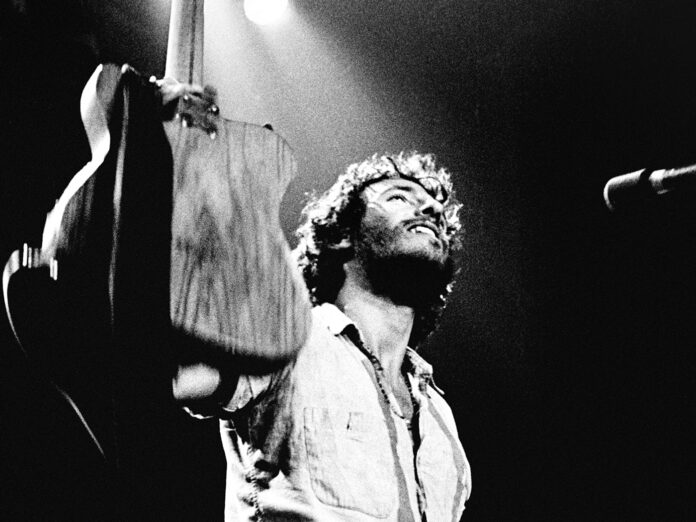Just about everybody who’s been to a Bruce Springsteen show has a story, and Hazel Wilkinson’s is particularly lovely one. She was a teenager when her brother queued all night for tickets to see Springsteen and the E Street Band at Manchester Apollo in May 1981, on the European leg of the River tour. They were at the front of the stalls when, two songs into the second half, Bruce sang “Sherry Darling”. During the saxophone solo he peered down at Hazel, called her up, and danced across the stage with her for a minute or two.
Just about everybody who’s been to a Bruce Springsteen show has a story, and Hazel Wilkinson’s is particularly lovely one. She was a teenager when her brother queued all night for tickets to see Springsteen and the E Street Band at Manchester Apollo in May 1981, on the European leg of the River tour. They were at the front of the stalls when, two songs into the second half, Bruce sang “Sherry Darling”. During the saxophone solo he peered down at Hazel, called her up, and danced across the stage with her for a minute or two.
“I looked into his eyes and he was looking into mine,” she remembered. He took her hand and kissed it before making sure she was escorted safely back to the floor. “I stood there and thought, ‘Did that really happen? Was I imagining it?’ I was 17 years old, I was just finding my way, I wasn’t that popular or that confident. It was that moment of being seen, being noticed, being picked out by this guy who was one of my heroes. It was a moment to treasure.”
She’s one of the voices in a new hour-long BBC documentary on Springsteen’s half-century history with British audiences, which began with two concerts at Hammersmith Odeon in 1975. He recalls how daunted he felt on his first trip outside the US. “British culture changed my life,” he says, talking about his love of The Beatles, the Stones and the Animals. “What did I have that I could conceivably give back to these people who gave me so much? The answer was, everything I’ve got.”
He mentions his anger at the record company hype that preceded the opening night and repeats the well-known story of how he went around ripping up the posters and flyers telling the world that “Finally, London is ready for Bruce Springsteen.” Among those present for those concerts were Michael Palin and Peter Gabriel, who offer their warm testimony. Palin even reads from the diary entry he wrote afterwards.
Neither of them, however, can evoke in their words either the crackling tension that accompanied that first show – after which Springsteen skipped the party and went straight back to his hotel room, suffering, he says, from a form of PTSD – nor the sense of relief, relaxation and joy that suffused the second one, six days later. And there’s no one to describe how, on his next visit to London in 1981, he opened the first of his six nights at Wembley Arena by tearing into “Born To Run” with his eyes closed, in a spasm of catharsis.
But there are more good stories in the film, and one of the best comes from Rob Heron, a Durham miner, and his wife Juliana, who helped with a women’s support group for the striking colliers. What Juliana remembers of attending the first UK date of the 1981 tour, at Newcastle City Hall, is one of her fellow organisers being summoned to Bruce’s dressing room during the interval and returning with a cheque for $20,000 for the support fund from the man who’d written songs about devastated industrial communities and ruined lives.
It was in 1987 that Sarfraz Manzoor, a 16-year-old in Luton, discovered Springsteen and found in the song “Independence Day” something that helped him overcome a difficult relationship with his own father. In 2019, by then a distinguished journalist and broadcaster, Manzoor co-wrote Blinded By The Light, a feature film directed by Gurinder Chadha, who first heard Born To Run while doing at Saturday job in Harrods’ record department as a teenager.
These people – along with longtime fanzine editor Dan French, Sting, the comedian Rob Bryden (who kept a Springsteen scrapbook), the promoter Harvey Goldsmith, the journalist David Hepworth, the E Street stalwart Steve Van Zandt and Springsteen’s managers both past (Mike Appel) and present (Jon Landau) – form a mosaic of voices dropped in amid the relevant clips of live performances.
Those shows in Hammersmith represented a big step: they were the band’s first performances after spending two years in clubs like Paul’s Mall in Boston, the Bottom Line in New York and the Troubadour in West Hollywood. A thread implicit in When Bruce Springsteen Came To Britain is an inexorable upscaling across 50 years, from theatres to stadiums to the biggest arenas available. The miracle of its central figure is how, while expending so much energy on growing his audience around the world, he seems to have hung on to his own sense of a very human scale. It’s an affectionate and admiring film, and none the worse for that.
When Bruce Springsteen Came To Britain airs on BBC Two on May 31 and on iPlayer afterwards



